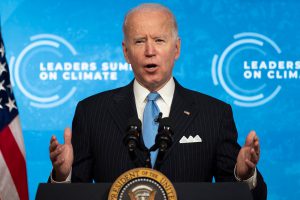Even with smart development support from the US, African governments must improve climate governance
The Trump administration, including former president Donald Trump himself, peddled conspiracy theories, questioned the existence of climate change, and, based on this, rolled back a number of environmental protection policies designed to reduce greenhouse gas (GHG) emissions in the US. Without scientific evidence to justify his claims, and in furtherance of his populist, ultra-right-wing politics, Trump consistently questioned scientific consensus on climate change and called it “a hoax”.
Some of his senior officials shared this non-scientific ideological position and propensity to question climate science. Among them was Kelly Craft, the US’s former UN ambassador, who argued that “there are scientists on both sides that are accurate”, while the former director of the Office of Management and Budget, Mick Mulvaney, was of the view that federal funding for climate science is “a waste of your money”. Similarly, Ryan Zinke, the former secretary of the interior, was a proponent of increased shale extraction and oil pipelines without due care for GHG emissions and the effects of the energy industry on global warming. Unsurprisingly, these neoliberal, pro-big business views strongly influenced the Trump administration’s climate policy.

A picuture taken on February 9, 2021, shows a swarm of desert locust fly after an aircraft sprayed pesticide in Meru, Kenya. – The United Nations Food and Agricultural Organisation works with a variety of Kenyan security, logistics and charter companies who have expanded their operations to closely track swarms of locusts in East Africa, before dispatching teams to targeted areas to spray the insects with pesticides to prevent damage to crops and grazing areas.It has been over a year since the worst desert locust infestation in decades hit the region, and while another wave of the insects is spreading through Somalia, Ethiopia and Kenya, the use of cutting edge technology and improved co-ordination is helping to crush the ravenous swarms and protect the livelihoods of thousands of farmers. (Photo by Yasuyoshi CHIBA / AFP)
One of Trump’s first executive orders targeted reversing former president Barack Obama’s climate policies, such as the Clean Power Plan (CPP), which sought to reduce GHG emissions in the US’s energy sector. Trump’s Affordable Clean Energy (ACE) replaced the CPP in June 2019, thereby dismantling a climate-conscious plan with clear regulatory action pillars and emission reduction targets. The ACE, a pro-big business policy, was deliberately less ambitious in enforcing emission targets. In fact, it argued for between 0.7% and 1.5% reduction, very different from the 32% below 2005 levels by 2030 proposed in the CPP. Consequently, emissions increased during the Trump era, given the administration’s open support for the biggest emitters in the oil and power sector. This affected global mitigation efforts and had direct negative implications for adaptation and the livelihoods of many in the Global South, and more so in Africa.

WASHINGTON, DC – OCTOBER 21: A woman walks by a projection of flames and commentary on the side of the Trump International Hotel organized by activists in protest of President Donald Trump’s response to science and climate change in the face of devastating wild fires burning throughout the United States on October 21, 2020 in Washington, DC. Jemal Countess/Getty Images for Climate Power 2020/AFP (Photo by Jemal Countess / GETTY IMAGES NORTH AMERICA / Getty Images via AFP)
When it came to global climate decision-making platforms, the Trump effect was seismic. Based on climate denialism, with overt support for and from oil and energy companies, he pulled the US out of the Paris Agreement in 2017. By withdrawing from this legally binding international treaty, the Trump administration effectively absolved the US’s biggest polluters from adhering to global emission targets, and set the path for abandoning his government’s climate finance contributions under the UN’s financial mechanism. While some might interpret this as “political gamesmanship”, the fact is this was blatantly derisive of long-established global climate negotiation and action platforms. His executive actions were also about protecting the interests of big businesses in the coal, crude oil and other high emissions sector, regardless of the environmental pollution and climate crisis they perpetuate. While the Trump era, which weaponised its superpower standing to destabilise global climate action platforms and institutions, is gone, it certainly provided lessons on how destructive unrestrained executive power of the American presidency can be to the global climate agenda.
As the 46th president of the US, Joe Biden, Trump’s successor, settles in office and defines his climate agenda, it is important to explore his initial steps and make meaning of the direction he is taking, specifically in relation to the African continent.
From the onset, the Biden administration has shifted and refocused the US’s climate change agenda. Domestically, significant steps in realigning or setting up institutions to lead climate action are underway. Gina McCarthy, former head of the Environment Protection Agency in the Obama administration, was appointed as the first White House national climate adviser. As the domestic climate czar, McCarthy’s portfolio includes spearheading aggressive policy changes that will lead to unprecedented carbon cuts as the US attempts to transition to a greener, low-carbon economy. To achieve this, the goal is to transform the country into a clean energy economy through eliminating pollution from fossil fuels by 2035, transition to a carbon-free national electricity grid by 2035, and decarbonisation of the entire economy by 2050. This pronouncement is not hollow climate politics; it is backed by a US$2 trillion plan for new infrastructure, some of which will create clean-energy jobs in the solar and electrical cars sectors. In all likelihood, even though transformation of the energy economy will not happen at the speed desired by the Biden administration, there are signs it will progressively change since the private sector is investing heavily in the growing solar and wind energy sector in anticipation of lucrative returns.

US President Joe Biden delivers remarks and participates in the virtual Leaders Summit on Climate Session 5: The Economic Opportunities of Climate Action from the White House in Washington, DC, on April 23, 2021. (Photo by JIM WATSON / AFP)
This market-driven growth, for all its notable green credentials, is hardly surprising given the profit motive driving private-sector investments in this and other emerging profitable green sectors. Further, although there are promising signs of gradual decarbonisation, it would be amiss to give an impression that this transition will be seamless. As we know, there are many American big businesses, specifically in the fossil fuels, aviation, automobile and manufacturing industries, that have been largely reticent to transition to greener clean production and technology as this directly affects their business models and profits.
The US domestic climate actions under Biden cannot be divorced from the African climate action agenda. There is a continuum directly linking their domestic actions with climate mitigation and adaptation on the African continent. This nexus is direct, because a net-zero carbon American economy pursued by the Biden administration will alter the amount of GHGs emitted into the atmosphere, hence reduction in global warming, to some degree, in the long term. Beyond climate mitigation benefits, perhaps re-entry of the USA into global climate diplomacy is the headline-grabbing and defining moment.
Regaining the climate diplomacy trust broken under Trump is at the epicentre of Biden’s decision to rejoin the Paris Agreement, the flagship accord in climate actions on record. This re-engagement builds on his inauguration speech of 20 January 2021, in which he pledged, “we will repair our alliances and engage with the world once again. Not to meet yesterday’s challenges, but today’s and tomorrow’s”, which include the climate emergency.
He followed this up in his first foreign policy speech on 4 February 2021, when he directly focused on climate change: “On day one, I signed the paperwork to rejoin the Paris Climate Agreement. We’re taking steps led by the example of integrating climate objectives across all of our diplomacy and raising the ambition of our climate targets. That way, we can challenge other nations, other major emitters, to up the ante on their own commitments. I’ll be hosting climate leaders — a climate leaders’ summit to address the climate crisis on Earth Day of this year.”
This ambitious agenda of global climate cooperation and action signals how America now views and approaches this existential threat as opposed to climate denialism under Trump from 2016-2020. For the Biden administration, this revitalisation of climate diplomacy is a central element of its foreign policy agenda in which it is repositioning itself as a beacon of the “free world” that must lead in climate mitigation, adaptation and resilience.
To drive this point home, in January 2021, Biden appointed senior Democrat and former secretary of state (2013-17) John Kerry (2013-17) as the first special presidential envoy for climate change. Not only is Kerry America’s climate diplomat, but he also sits in the National Security Council as a climate change principal, a first in the US’s national security establishment. This not only emphasises the security conflict implications emerging from the climate emergency but also reiterates how responses to it must be based on cooperation at a global level.
While progressive climate messaging is good politics, and perhaps attractive “green talk”, ultimately what matters most are tangible actions on the ground, specifically in the Global South. Therefore, the real test for the Biden administration will be what it does to enhance climate change mitigation, adaptation and resilience-building in Africa.
First, in terms of mitigation, close attention must be paid to the practical actions to be undertaken in reducing GHG emissions by the US industrial behemoth and its oil-energy complex. Failure to reduce emissions will render the objective of decarbonising America’s economy by 2050 hollow political rhetoric, with snowball effects on the continued global warming that is devastating lives and livelihoods in Africa. It will also reduce the chances of achieving the Paris Agreement’s goal “to limit global warming to well below two, preferably to 1.5 degrees Celsius, compared to pre-industrial levels”.
Secondly, at a global level, the Biden administration has the capacity to use its soft power to appeal to other major polluters in the G7, as well as China, India and Russia, to lower their emissions in line with Paris Agreement targets. Complicated as this is in geopolitics, for this non-coercive soft power diplomacy to work, the US must lead by example through lowering its own emissions and thereby building a powerful example for other major polluters and the Global South to observe, learn from and emulate. At the risk of oversimplification: such global cooperation in lowering emissions, hence enabling mitigation, is one of the primary factors that will determine whether meaningful progress will be made towards achieving Sustainable Development Goal (SDG) 13 (climate action) by 2030.
Thirdly, as one of the biggest polluters, the USA has a responsibility to honour and implement the UN Framework Convention on Climate Change’s principle of “common but differentiated responsibility based on respective capabilities” in technically, technologically and financially supporting adaptation interventions in Africa. In this regard, the Biden administration’s commitment to climate action in Africa also has to be evaluated based on actual climate finance to be expended through the UN’s climate finance mechanism or its international development agencies, such as the US Agency for International Development (USAID). The level of climate financing will also be a practical indicator of their commitment to climate justice given the US economic, social, moral, political and legal responsibility to provide some form of reparation to African countries at the “coal-face” of climate impacts.
Lastly, African governments must also be proactive in implementing their endogenous mitigation, adaptation and resilience programmes within the geopolitical matrix within which the US remains the superpower. While climate-smart development support from the US, and other countries in the Global North, will remain important for the near future, African governments must improve their climate governance and actions. This includes channelling adequate locally generated resources towards practical implementation of their climate adaptation policies and resilience-building strategies at local community level, where the poor and vulnerable continue to adapt in perilous environments.
To enhance these local resilience-building efforts, African governments must also use their persuasive and administrative power to attract the private sector into public-private partnerships in local climate-smart development initiatives. Although they may be contested given the profit motive that largely drives private-sector decision-making, such public-private partnerships have the potential to drive mitigation efforts in the African oil-energy sector, while also providing important funding, technology and technical expertise for resilience-building at local community level.










